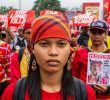By Grace S. Uddin
davaotoday.com
DAVAO CITY — The indemnification of victims of human-rights violation during the Marcos dictatorship may be delayed some more as several matters continue to beleaguer their quest for justice.
Last Tuesday, Selda (Samahan ng mga Ex- Detainee Laban sa Detensyon at para sa Amnestiya) gathered some of its members in the city and region to petition for the reduction of litigation fees and expenses, from 30% to 10%.
The victims� lawyers in the class suit, which involves almost 10,000 plaintiffs who suffered from torture and other abuses during the Marcos dictatorship, want 30% of the indemnification funds awarded to the victims. The amount sought by the lawyers does not include the reimbursement of their professional expenses totaling more than $1 million, according to Nicanor Gonzales, Selda�s chairman in Southern Mindanao.
Moreover, the lawyers have also requested the court to set aside $775,000 to cover fees and expenses that have been or will be used in the administration and distribution of the indemnification payments, as well as payments for a special counsel in Singapore.
Gonzales said the 30% lawyer�s fee is too large, considering that whatever is left of the award money of $684 million would also be shared by all of the victims.
The lawyers had filed for these fees and expenses before a US court in Honolulu, Hawaii. Selda will submit its petition opposing the lawyers� move this month; hearings have been set on June 26, 2006.
Another problem that Selda tries to resolve is the petition filed by the Philippine government before the Hawaii court. �Instead of distributing the claims to the claimants individually, the Philippine government wants to distribute it from government to government,� Gonzales said.
�We had a bad experience about this before,� Gonzales said. �The sum of eight billion pesos was used supposedly for land reform and the detainees did not receive anything.�
This particular amount was in the news lately when the Arroyo administration was accused of using it to fund President Arroyo�s election campaign in the 2004 elections. The eight billion pesos was supposedly set aside for payments to the Marcos victims but, because of the Comprehensive Agrarian Reform Law (CARL), which states that all recovered Marcos ill-gotten wealth should finance the agrarian-reform program, it was not distributed to the claimants.
Analysts and lawyers have criticized the failure by the Congress to pass a law will that will exempt the award money for the victims from CARL. Human-rights groups have also been trying to pressure Congress into approving an indemnification bill.
The $684 million is currently held in an escrow account in the Philippine National Bank. It was earlier released to the Philippines by the Swiss Supreme Court, which ruled that it was part of the Marcoses� hidden wealth stashed in a Swiss account. (See related story.)
A US court earlier ordered the indemnification of Marcos victims with $2 billion from the late strongman�s estate. But this order has not been complied with because it has been tied up in legal wranglings.
There had been fears that a compromise agreement supposedly being hatched by the Presidential Commission on Government, the agency tasked to recover the Marcos wealth, would favor the Marcoses more than their victims and the Filipino people. Former senator Jovito Salonga, the commission�s first chairman, compared the compromise agreement as akin to �cutting a deal with Hitler.�
According to statistics from Selda, there are 9, 539 claimants of the Marcos wealth, mainly victims of torture and relatives of those who were summarily executed or have gone missing during the dictatorship.(Grace S. Uddin/davaotoday.com)










